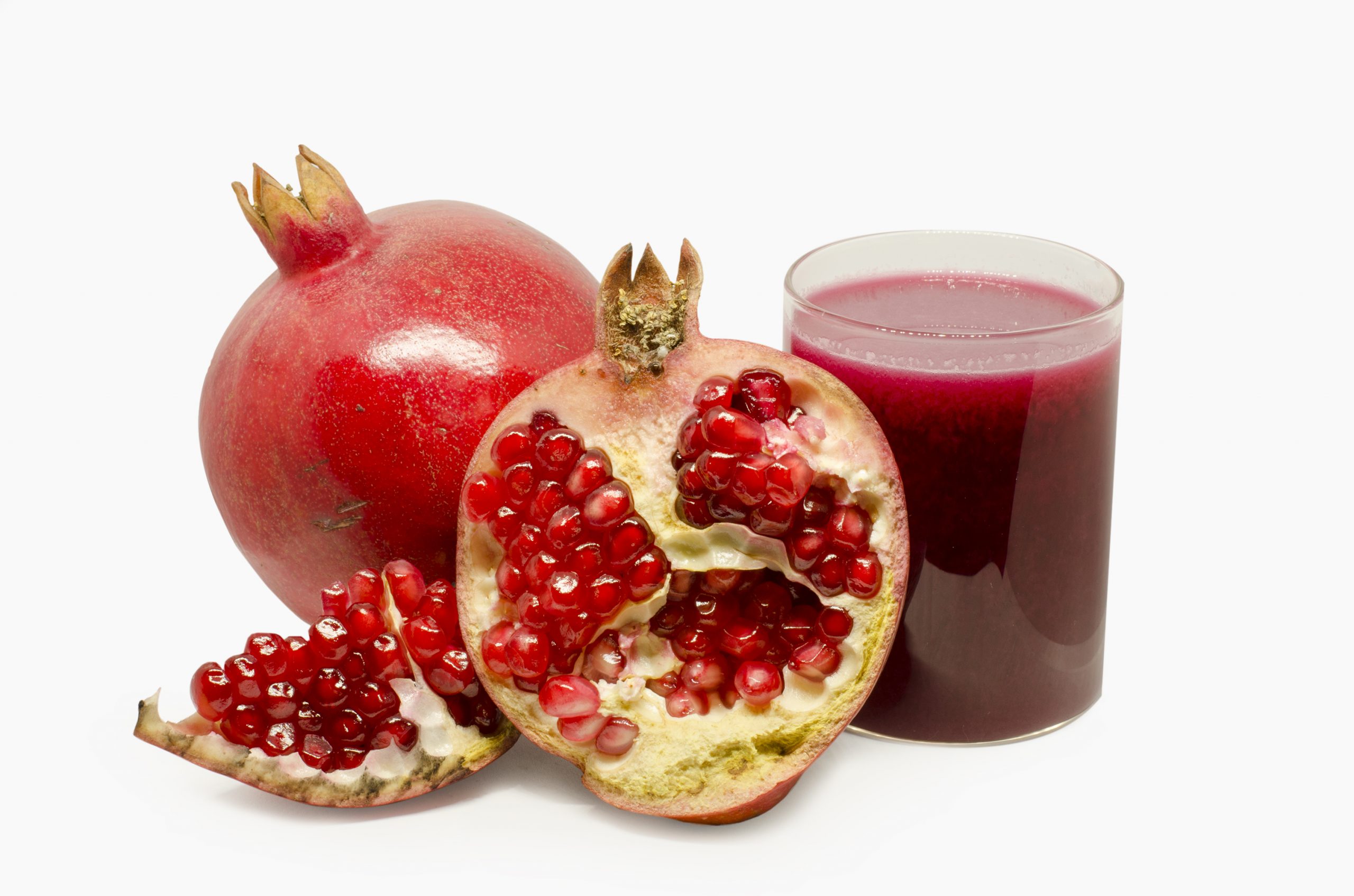
اللهُمَ إنَّا نَعُوذُ بِكَ مِن جَهْدِ البَلاءِ ودَرْكِ الشَّقَاءِ وسُوءِ القَضَاءِ وشَمَاتَةِ الأعْدَاءِ
POMEGRANATE
رُمَّانٌ : قال تعالى:{فِيهِمَا فَاكِهَةٌ وَنَخْلٌ وَرُمَّانٌ} (الرحمن : 68) ويُذكر عن ابن عباس موقوفاً ومرفوعاً: (ما مِن رُمَّانٍ من رُمَّانِكم هذا إلا وهو مُلقَّحٌ بحبَّةٍ من رُمَّانِ الجَنَّةِ) والموقوفُ أشْبَهُ. وذكر حَربٌ وغيره عن علىٍّ أنه قال: (كُلُوا الرُّمَّانَ بِشحْمِه، فإنه دباغُ المَعِدَةِ). حلوُ الرُّمَّان حار رطب، جيدٌ للمَعِدَة، مقوٍ لها بما فيه من قبْضٍ لطيف، نافع للحلق والصدر والرِّئة، جيدٌ للسُّعال، وماؤه مُلَيِّن للبطن، يَغْذى البدن غِذاءً فاضلاً يسيراً، سريعُ التحلُّل لرِّقَّته ولطافته، ويُولِّد حرارة يسيرة في المعدة وريحاً، ولذلك يُعين على الباه، ولا يصلح للمَحْمُومين، وله خاصيَّة عجيبة إذا أُكل بالخبز يمنعه من الفساد في المعدة.وحامضه بارد يابس، قابض لطيف، ينفع المَعِدَة الملتهبة، ويُدِرُّ البَوْل أكثرَ من غيره من الرُّمَّان،
ويُسكِّنُ الصَّفْراء، ويقطع الإسهال، ويمنع القىء، ويُلطِّف الفضول، ويُطفىءُ حرارة الكبد، ويُقَوِّى الأعضاء، نافع من الخَفَقان الصَّفراوى، والآلام العارضة للقلب، وفم المعدة، ويُقوِّى المَعِدَة، ويدفع الفُضول عنها، ويُطفئُ المِرَّة الصفراء والدم
وإذا استُخرجَ ماؤه بشَحْمه، وطُبِخَ بيسير من العسل حتى يصير كالمرهم، واكتُحِلَ به، قطع الصفرة من العَيْن، ونقَّاها من الرطوبات الغليظة، وإذا لُطخ على اللِّثَة، نفع من الأَكلة العارضة لها، وإن استُخرج ماؤهما بشحمهما، أطلَق البطن، وأحْدَر الرُّطوباتِ العَفِنَةَ المُرِّية، ونفع مِن حُميَّات الغب المُتطاوِلة. وأما الرُّمَّان المزُّ، فمتوسط طبعاً وفعلاً بين النوعين، وهذا أمْيَلُ إلى لطافة الحامض قليلاً، وحَبُّ الرُّمَّان مع العسل طِلاءٌ للداحِس والقروح الخبيثة، وأقماعُه للجراحات، قالوا: ومَن ابتلع ثلاثةً من جُنبُذِ الرُّمَّان في كل سنة، أمِنَ مِنَ الرَّمد سنته كلَّها
Allah Said in Quran:
“In them (both) will be fruits, and date palms and pomegranates”. (55:68)
Ali Bin Abi Talib Radi Allaho Anh was reported to have said: “Eat pomegranate with its pulp, because it coats the stomach”.
Sweet pomegranate is hot and wet, good for the stomach, and strengthens it because of its being a mi1d constipating agent. It is good for the throat, chest and lungs, along with relieving coughing. The water (or juice) in the pomegranate softens the stomach and is a nutrient for the body. It digests quickly because it is light and produces heat along with some air in the stomach. It helps increase the semen production and is not favorable for those who have fever. Pomegranate has a special quality, that is, when one eats bread with it, it prevents it from being spoiled.
Bitter pomegranate is cold and dry and constipates mildly. It is in addition good for overheated stomach and helps produce more urine than the other types of pomegranate. It softens yellow bile symptoms, relieves diarrhea, prevents vomiting and is slightly tarry. It in addition stops the heat in the liver, strengthens the organs, helps against bilious shaking, heartaches and the ache of the tip of the stomach, it helps the stomach, rids it of excrements, extinguishes the excessive yellow bile, and benefits the blood.
When pomegranate’s juice is extracted and is cooked with some honey until it becomes like an ointment and used as eye drops, it will clear the yellow color from the eye and will dissipate the thick wetness. When it is placed on the gingival (gums), it will help against the rashes that appear on the gingival. In addition, pomegranate juice extracted with its rind will work as a laxative and will rid the body from septic bilious moistures, along with helping against short-term fever.
As for sour pomegranate, its qualities are in the middle between the two other kinds we mentioned, although this kind leans more towards being sour. Pomegranate seeds that are mixed with honey will alleviate septic finger and malignant ulcers. Pomegranate flowers help to heal wounds. It is said that if one swallows three pomegranate flowers each year, he will be immune from Ophthalmia (conjunctivitis) for an entire year.
Names
- It is called Rumman in Hadees, Quran & Arabic.
In Hindi it is called as Anaar.
3. In Sanskrit it is called as Dadim.
4. In Latin it is called as Puncia granatum Linn.
5. Its family is Punicacea.
6. In English it is called as Pomegranate
Quranic references of Pomegranate (Anaar)
- Chapter No. 6 (Surah) An’am verse no. 99: –
وَمِنَ النَّخْلِ مِن طَلْعِهَا قِنْوَانٌ دَانِيَةٌ وَجَنَّاتٍ مِّنْ أَعْنَابٍ وَالزَّيْتُونَ وَالرُّمَّانَ مُشْتَبِهًا وَغَيْرَ مُتَشَابِهٍ
Out of the date-palm and its sheaths (or spathes) (come) clusters of dates hanging low and near: and (then there are) gardens of grapes, and olives, and pomegranates, each similar (in kind) yet different (in variety):
- Chapter No. 6 (Surah) An’am verse no. 141: –
وَهُوَ الَّذِي أَنشَأَ جَنَّاتٍ مَّعْرُوشَاتٍ وَغَيْرَ مَعْرُوشَاتٍ وَالنَّخْلَ وَالزَّرْعَ مُخْتَلِفًا أُكُلُهُ وَالزَّيْتُونَ وَالرُّمَّانَ مُتَشَابِهًا وَغَيْرَ مُتَشَابِهٍ
It is He Who produce the gardens, with trellises and without, and dates, and tilth with produce of all kinds, and olives and pomegranates, similar (in kind) and different (in variety): eat of their fruit in their season.
- Chapter No. 55 (Surah) Rahmaan verse no. 68 & 69: –
فِيهِمَا فَاكِهَةٌ وَنَخْلٌ وَرُمَّانٌ (68) فَبِأَيِّ آلَاءِ رَبِّكُمَا تُكَذِّبَانِ (69)
In them will be Fruits, and dates and pomegranates: Then which of the favours of your Lord will ye deny?
Prophet e’s guidance about Anaar (pomegranate(
One seed of JANNAH in every Rumman (Anaar):
– 1. Hazrat Anas t once asked to Rasoolullah e about Rumman (pomegranate) (Anaar); Rasoolullah e replied that there is no Rumman )pomegranate) (Anaar) in which there isn’t one seed of Jannah (pomegranate) Anaar [Abu Nu-aim: 363]
(Means every Rumman (pomegranate) (Anaar) has one seed of Jannah).
- Hazrat Abdullah Bin Abbas had a habit, whenever he found or got a grain of Anaar (pomegranate) (Rumman) he use to eat it & use to say, there is no Rumman )pomegranate) (Anaar) which do not have an element of Jannah in its grain (dana). [Abu Nu-aim: 802]
Eat internal coating (parda) of Rumman (Anaar): –
- Hazrat Ali says that Nabi e said, eat Rumman (pomegranate) (Anaar) & its internal coating (a thin membrane like), it coats the stomach. [Abu Nu-aim: 365] (The coating acts on healing of gastric ulcers & is beneficial for whole intestine).
Rumman enlightens the Qalb: –
- Hazrat Ali says that whoever eats Rumman (pomegranate) (Anaar), Allah I will enlighten (noor) his Qalb (heart). [Abu Nu-aim: 801]
Eat Rumman to drive away the shaitaan: –
- It is mentioned in Abu Nuaim that anyone who eats Rumman (pomegranate), shaitaan runs away from him. [Abu Nu-aim: 363]
Other references in Deeni Books
- Hazrat Ibn Qayyim (ra) said sweet Anaar is good for digestive system & gives strength.
2. Anaar is hot in potency & juicy.
3. Good for throat, lungs, chest diseases & reliefs cough.
4. Its juice is Laxative (induces stools), increases sexual desire, but should not be used in fever.
5. The sour one is good in stomach infections & increases urine output.
6. It stops motion, diarrhea, vomiting & etc.
7. Al Razi t says that sour reduces sexual desire.
8. Best if eaten on empty stomach.
Contents of it: –
Vitamin C, calcium, phosphates, sulphur, sodium, potassium, tannin, protein, water, iron, phosphate, manganese & etc.
Scientific benefits of pomegranate: –
- There are 3 types of pomegranate: – sweet, sour & slight bitter (The reddish coloured is best).
The sweet one is rich in sugar, water, protein (in seeds), fibers, tannin, citric acid, minerals, iron, phosphate, sulphur, calcium, potassium, manganese, vitamin C etc.
3. The sour one has less sugar & more citric acid, more protein in seeds, more carbohydrate.
4. The outer skin of it has tannic acid & is good for diarrhea, dysentery, bleeding in digestive tract.
5. Boil the skin of it, in little water for 15 minutes on low flame, than filter it & drink it 2 to 4 times during motions.
6. Eat it on empty stomach, it is good for digestion & strengthen the heart, lungs, liver etc.
7. Its skin is used to fix the color while dying (And also used with Mehndi). (Means the skin should be boiled in water & this water should be used).
8. Protects from gouts (Gouts means increased uric acid in blood & collection of it in various parts of body).
9. Good in infection like dengue, malaria, flu.
10. Helpful in viral infection, cold, coughs, gums & mouth problems. & also reduces swelling.
11. Good for high BP, piles.
12. Best for colitis, anemia, arthritis, TB etc.
13. Its flower is called as Gulnar & good for health.
14. Its skin root is also very helpful.
15. It is best in pregnancy, old, ill & children.
16. Anaar Dana (dried seeds) is good for digestion & acidity.
17. Removes weakness.
18. Can be used all season.
Science & Hadees regarding pomegranate: –
Hadees says that pomegranate enlightens the Qalb (heart), this is clinically proven that it is beneficial for heart disease. Pomegranate juice or pomegranates are under research for healing heart diseases, risk factors including reduce in LDL. Including LDL oxidation, macrophage oxidative status & foam cell formation. In a limited study of hypertensive (blood pressure) patients, consumption of pomegranate juice for two weeks was shown to reduce systolic blood pressure by inhibiting serum angiotensin-converting enzyme (ACE inhibitor). It has sugars, Vitamin C & Iron from fruit juice, Tannic acid from rind & alkaloid pelletierine from bark. As Hadees mentions that it has an element of Jannah, this is only said for pomegranate fruits only, it is yet to research what chemical that might be, but it has miraculous results in treatment. WE ALL should use them, they are rich in fibers thus cleans the digestive system. It kills bacteria also. Its outer skin & internal coating are very beneficial for health, especially its skin when boiled in water, this water helps in stopping loose motions. The major class of phytochemical present in pomegranate is the polyphenols & includes flavonoids, condensed tannins & hydrolysable tannins. Hydrolysable tannins are predominant polyphenols found in pomegranate juice & account for 92% of its antioxidant activity. Pomegranate seeds are rich in sugars, polyunsaturated (n-3) fatty acids, vitamins, polysaccharides, polyphenols & minerals & have high antioxidant activity. When crushed & dried, the seeds produce oil with 80% punicic acid, the 18-carbon fatty acid, along with the isoflavone genistein, the phytoestrogen coumestrol & the sex steroid estrone. The seed coat of the fruit contains delphinidin-3-glucoside, delphinidin-3, 5- diglucoside, cyanidin-3-glucoside, cyanidin-3, 5-diglucoside, pelargonidin-3- glucoside & pelargonidin-3,5-diglucoside with delphinidin 3,5-diglucoside being the major anthocyanin in pomegranate juice.
Conclusion of Hadees: –
Every pomegranate has one element of Jannah in it. Eat internal coats (parda) of it, which is inside the fruit between lobes. It is beneficial in disease. By eating it shaitaan run way. It enlightens the Qalb (heart).


